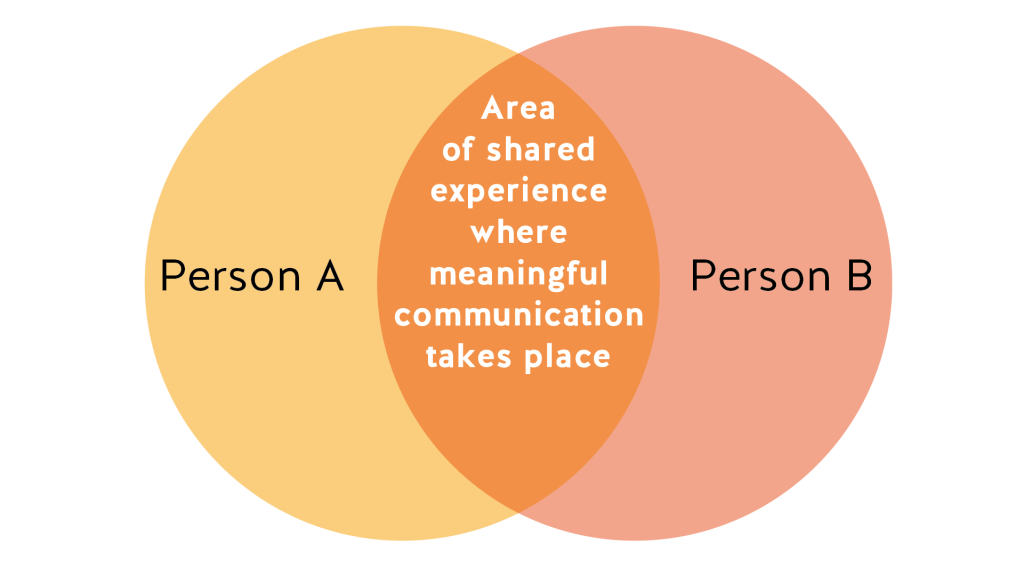“The single biggest problem in communication is the illusion that it has taken place“
– George Bernard Shaw
Do we need strategies?
Some people might ask, “Why do we need evangelistic strategies at all? Surely we are just called on to preach the gospel, plain and straight, and leave God to do the rest?” Even the words ‘communication strategies’ may seem to imply worldly marketing methods rather than a dependence on the power of the gospel through the Holy Spirit. There are a number of answers to this very reasonable question:
- The word ‘preach’ does not just mean ‘one-way verbal communication’ – as in a sermon or evangelistic address. It has a much broader sense – ‘to effectively communicate’. If the receivers have not understood the message, real communication has probably not occurred.
- The word ‘communicate’ also has a root meaning that helps us: that of ‘communing’ or interacting over ‘common’ ground.
“You cannot teach people unless you have their attention . . . by using illustrations, questions and even humor. Most people don’t like to be preached at, but most people like to be talked to.”
– Trevor McIlwain, Firm Foundations, New Tribes Mission
- Strategies and methods are not substitutes for proclaiming the full biblical gospel using the wisdom and inspiration of the Holy Spirit, backed up by believing prayer. They do not replace or diminish our biblical understanding of the fallen nature of the human race, or the spiritual blindness imposed by the powers of darkness. They are, or should be, vehicles to carry the full biblical message across into people’s hearts. Regeneration is a work of sovereign grace by the Holy Spirit.
Strategies in mission
- We can see in both the Old and New Testaments many different strategies used by Jesus and God’s servants to communicate effectively in various situations. We see Old Testament prophets using visual aids, the Lord Jesus using short stories (often containing humor), while Paul spent two years in a daily dialogue discussion ministry (Acts 19:2-10), which must have had parallels with interactive studies such as Alpha courses.
- Study of church history and missiology demonstrates many strategies which God has used for effective communication: some would not work today; others only work in a particular culture.
- Cross-cultural missions have helped us to see the importance of research and classifying people into different ethnic and social groups – in order to assess if we are reaching them effectively or not. Too often, in any situation, we manage to reach the ‘easy’ groups – often those with some degree of Christian background – the ‘once-churched’. Yet we fail to reach (and fail to notice that we are failing) the ‘never-churched’.
- Missions have also helped us to see the importance of understanding the culture of a target group, and presenting the Gospel in the context of that culture, (for which the technical term is contextualization). Understanding the culture and mindset of those even in our own country is essential if we are to reach them.
- There is only one gospel. It is unique, powerful, and (in the popular sense of the term) incredible – for it can be understood by a young child with learning difficulties, yet be intellectually satisfying to the cleverest professor. No other philosophy or belief system can do that. However, our presentation of the gospel should not be ‘one size fits all’. If you are a cook, you do not just cook a generic all-purpose meal. You cook a meal according to the needs of the eaters, the context in which they are eating, their health, age, background, and most importantly, what they are actually prepared to eat! Just as we would present the gospel in different terms to children and students, so we must tailor our presentation to the needs and culture of every other group also. There are many creative ways of sharing the good news.
Targeted communication
- The internet gives us a unique way of targeting specific ethnic, social, age, and special-interest groups on a world-wide basis. The ‘pull’ nature of the web as a medium is a God-given tool which has not been available to us until now. It can only be used fully when we create pages that interest each target group, or answer felt needs, and then explain the gospel to them in appropriate terms and jargon-free language that they can understand. This ‘bridge strategy’ is especially valuable for the Web, and has biblical mandate.
- Pioneer communicator Wilbur Schramm showed us that people can only communicate effectively when there is an area of shared interest. It helps to see this using overlapping circles.

Since we are the ones trying to communicate, guess who has to make the first move and find the area of common ground? This is utterly biblical and 1 Corinthians 9:19–23 is but one expression of the Father heart of God calling us to reach out and identify with people where they are and find an area of common ground. It is of course expressed most vividly in the incarnation of the Lord Jesus. We can biblically present the gospel by taking people’s felt needs as a starting point. - The missiologists’ Engel Scale and Gray Matrix are not just for cross-cultural situations in the majority world. They are also highly useful to help us in local church outreach in the West because they help us to visualize where people stand spiritually, and then plan appropriate methods to reach them.
- It is also very helpful to understand how people learn – for then we can communicate more effectively with them.
- Creative planning is a pre-requisite for an effective online outreach.
- We need to be like the men of Issachar, who understood the times they lived in (1 Chronicles 12:32). Battles are always fought with strategies; we are in THE battle.
Share this Post
Photo credits (from top):
© Nemodus Photos. Used under a Creative Commons (CC-BY-NC-SA-2.0) licence.
© Tony Watkins. Usable under a Creative Commons (CC-BY-SA-4.0) licence.

